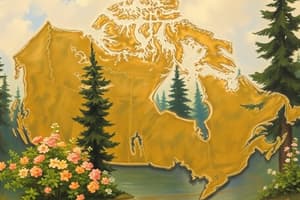Podcast
Questions and Answers
What are the three main types of climate regions?
What are the three main types of climate regions?
- Polar, arid, marine
- Dry, humid, moderate
- Continental, island, coastal
- Tropical, temperate, polar (correct)
Which of the following is NOT a factor that affects the climate of a region?
Which of the following is NOT a factor that affects the climate of a region?
- Elevation
- Wind patterns
- Latitude
- Air pollution (correct)
What unique challenges does the desert environment present for survival?
What unique challenges does the desert environment present for survival?
- Moderate temperatures
- Stable humidity levels
- Extreme heat during the day and cold nights (correct)
- Constant rainfall
How do humans adapt to survive in desert regions?
How do humans adapt to survive in desert regions?
What are some specialized skills that native peoples have developed to survive in deserts?
What are some specialized skills that native peoples have developed to survive in deserts?
Why do humidity levels fluctuate greatly in desert regions?
Why do humidity levels fluctuate greatly in desert regions?
Why do animals in desert regions rely mostly on internal body fluids?
Why do animals in desert regions rely mostly on internal body fluids?
What is one key adaptation necessary for both flora and fauna in desert regions?
What is one key adaptation necessary for both flora and fauna in desert regions?
Why is it challenging for people to cultivate crops in desert regions?
Why is it challenging for people to cultivate crops in desert regions?
What is a common strategy for people living in desert regions to deal with resource scarcity?
What is a common strategy for people living in desert regions to deal with resource scarcity?
How does the limited accessibility to water and nutrients impact vegetation in desert regions?
How does the limited accessibility to water and nutrients impact vegetation in desert regions?
Flashcards are hidden until you start studying
Study Notes
Climate regions refer to areas of Earth with similar climates due to geographical features, altitude, seasons, distance from oceans, or other natural conditions. These regional differences can have significant impacts on life forms found within them. There are three main types of climate regions: tropical, temperate, and polar. Each of these is further divided into subcategories based on their characteristics. Factors such as precipitation, temperature, relative humidity, wind patterns, air pressure, cloud cover, atmospheric gases, solar radiation, elevation, location, ocean currents, latitude, and seasonal changes all affect the climate of any region.
The most common climate regions are those of deserts, mountains, forests, plains, coastal, islands, lakes, and rivers. Desert regions, in particular, offer unique challenges for survival due to harsh environmental conditions caused by extreme heat during the day and cold nights. Humidity levels can also fluctuate greatly, leaving many parts of a desert area dry throughout the year yet wet at certain times. In order to survive in this type of environment, humans need to adapt to living without water and finding shelter from the intense sun. Many native peoples have developed specialized skills for surviving in the desert, including building shelters, hunting techniques, and food storage methods.
Life in desert regions is often characterized by animal species adapted to arid conditions, like camels, snakes, birds, reptiles, spiders, insects, and small mammals. Vegetation tends to be scarce, so animals must rely mostly on internal body fluids rather than external sources. Plants must make efficient use of available moisture and nutrients. Some plants store water underground while others grow only after rainfall occurs at regular intervals. This makes it difficult for people who live there to cultivate crops unless they bring supplies from elsewhere. Alternatively, people can move around looking for resources when needed.
In summary, understanding different climate regions requires knowledge of how various environmental factors contribute to each one's uniqueness. With regard to desert regions specifically, adaptation has been necessary among both flora and fauna due to limited accessibility to water and nutrient-rich soil.
Studying That Suits You
Use AI to generate personalized quizzes and flashcards to suit your learning preferences.




